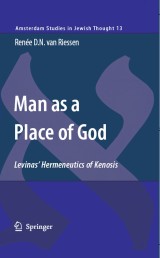Details

Man as a Place of God
Levinas' Hermeneutics of KenosisAmsterdam Studies in Jewish Philosophy, Band 13
|
139,09 € |
|
| Verlag: | Springer |
| Format: | |
| Veröffentl.: | 27.07.2007 |
| ISBN/EAN: | 9781402062285 |
| Sprache: | englisch |
| Anzahl Seiten: | 217 |
Dieses eBook enthält ein Wasserzeichen.
Beschreibungen
<P><EM>Man as a Place of God</EM> is an examination of Levinas’ philosophy of religion in the light of his ethics and anthropology. It provides a lively introduction to the main themes of Levinas’ thought and offers critical perspectives on Levinas by relating his work to that of Heidegger, Ricoeur, Rorty, Derrida and Vattimo. </P>
<P>The focus of interpretation is the hermeneutics of ‘kenosis’: the subject’s ability to be open towards the other to the point where man can be seen as a place of ‘God’, a place where the infinite attains to finite existence. Does this mean that the kenotic subject totally disappears from the arena of his own life, to reach out for a sublime existence that is no longer of ‘this world’ – as in the philosophy of Plato, Plotinus and certain mystical thinkers? This book will argue the reverse: the kenotic sublimity developed by Levinas is in keeping with ethics, and even with concrete acts of responsibility. Also, it refers to a certain idea of God, who comes into being in a ‘kenotic’ way: by giving himself in the ethical experience of man and woman, regardless of their culture and religious beliefs. </P>
<P>The focus of interpretation is the hermeneutics of ‘kenosis’: the subject’s ability to be open towards the other to the point where man can be seen as a place of ‘God’, a place where the infinite attains to finite existence. Does this mean that the kenotic subject totally disappears from the arena of his own life, to reach out for a sublime existence that is no longer of ‘this world’ – as in the philosophy of Plato, Plotinus and certain mystical thinkers? This book will argue the reverse: the kenotic sublimity developed by Levinas is in keeping with ethics, and even with concrete acts of responsibility. Also, it refers to a certain idea of God, who comes into being in a ‘kenotic’ way: by giving himself in the ethical experience of man and woman, regardless of their culture and religious beliefs. </P>
Explorations In Hermeneutics.- Time, Finiteness and Infinity: The Real Theme of Levinas' Conversation with Heidegger.- Interpreting Ourselves and Caring for Others: Levinas and Rorty.- The Other of the Other: Levinas and Derrida on Generosity and Transcendence.- Ethics, Religion, And Kenosis.- Evil, Transcendence, and God.- From Religion to Ethics: The Disruption of the Infinite.- Hermeneutics of Kenosis: The Road of Dispossession.
<P><EM>Man as a Place of God</EM> is an examination of Levinas’ philosophy of religion in the light of his ethics and anthropology. It provides a lively introduction to the main themes of Levinas’ thought and offers critical perspectives on Levinas by relating his work to that of Heidegger, Ricoeur, Rorty, Derrida and Vattimo. </P>
<P>The focus of interpretation is the hermeneutics of ‘kenosis’: the subject’s ability to be open towards the other to the point where man can be seen as a place of ‘God’, a place where the infinite attains to finite existence. Does this mean that the kenotic subject totally disappears from the arena of his own life, to reach out for a sublime existence that is no longer of ‘this world’ – as in the philosophy of Plato, Plotinus and certain mystical thinkers? This book will argue the reverse: the kenotic sublimity developed by Levinas is in keeping with ethics, and even with concrete acts of responsibility. Also, it refers to a certain idea of God, who comes into being in a ‘kenotic’ way: by giving himself in the ethical experience of man and woman, regardless of their culture and religious beliefs. </P>
<P>The focus of interpretation is the hermeneutics of ‘kenosis’: the subject’s ability to be open towards the other to the point where man can be seen as a place of ‘God’, a place where the infinite attains to finite existence. Does this mean that the kenotic subject totally disappears from the arena of his own life, to reach out for a sublime existence that is no longer of ‘this world’ – as in the philosophy of Plato, Plotinus and certain mystical thinkers? This book will argue the reverse: the kenotic sublimity developed by Levinas is in keeping with ethics, and even with concrete acts of responsibility. Also, it refers to a certain idea of God, who comes into being in a ‘kenotic’ way: by giving himself in the ethical experience of man and woman, regardless of their culture and religious beliefs. </P>
Offers an interpretation of Levinas’ philosophy of religion from the perspective of kenosis Relates Levinas’ anthropology to his philosophy of religion Compares Levinas’ hermeneutics of the self with that of Heidegger and Rorty Discusses Levinas’ idea of the infinite by forging a dialogue with Derrida, Vattimo and Ricoeur

















